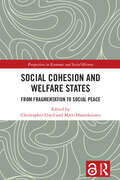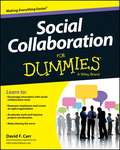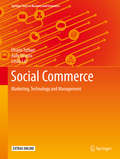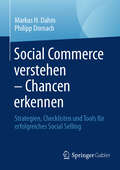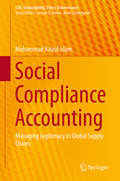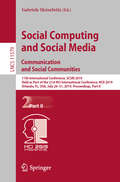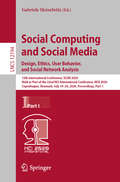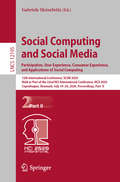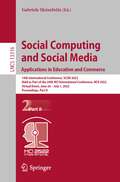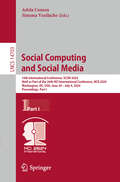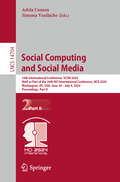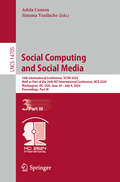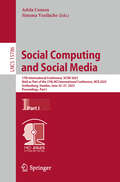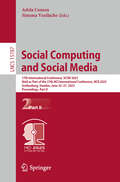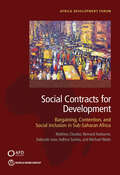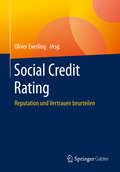- Table View
- List View
Social Cohesion and Welfare States: From Fragmentation to Social Peace (Perspectives in Economic and Social History)
by Christopher Lloyd Matti HannikainenAiming to go beyond reiterating the stereotypical narrative of the rise of welfare states, this interdisciplinary book examines the long-run historical processes of the development of the welfare state. It focuses on the complex political, social, economic and institutional transformations which give rise to these peaceful and cohesive societies. Welfare is crucial to the story of peaceful social integration and this book explores and explains this vital connection, taking a non-linear view of the history of moving from fragmentation to peace with comprehensive welfare institutions. Chapters collectively focus on three central areas: (a) types of socio-political fragmentation, (b) the interconnection of social, political, and economic forces that led to the institutionalisation of integrationist processes and policies (including re-distributional welfare systems), and (c) how this new institutional development helped achieve, or failed to achieve, social peace and welfare. The international panel of expert contributors provide case studies from a rich variety of country contexts, including Germany, South Africa, the Netherlands, Austria, and the Nordic Countries. This thought-provoking collection of essays is well suited for advanced students and researchers in social history, economic history, political economy and social policy.
Social Collaboration For Dummies
by David F. CarrRealize the potential of social collaboration in business with this easy-to-understand guideSocial media have proven to be an engaging and addictive mode of communication and information gathering for users on a personal level. However, by applying that same philosophy, a corporate collaboration system that employs social technologies could potentially get employees more involved in running an efficient and effective business. This fun and friendly guide shows you exactly how to put social networking to work in order to achieve business goals. Taking you beyond just the features and tools of social collaboration, the book focuses on where and how social collaboration principles and technologies can be applied in order to enhance the performance of an organization, regardless of how big or small it may be.Helps businesses understand how to introduce social collaboration practices into their organizations in order to create the results they are seekingDetails ways to transform a business into a social business by using social collaboration technologiesProvides case studies that exemplify ways in which business can engage and learn in social collaboration Social Collaboration For Dummies is an ideal introductory guide for anyone looking to use social collaboration to lead to improvements in productivity, organizational agility, innovation, and employee engagement.
Social Commerce
by Judy Strauss Efraim Turban Linda LaiThis is a multidisciplinary textbook on social commerce by leading authors of e-commerce and e-marketing textbooks, with contributions by several industry experts. It is effectively the first true textbook on this topic and can be used in one of the following ways: Textbook for a standalone elective course at the undergraduate or graduate levels (including MBA and executive MBA programs) Supplementary text in marketing, management or Information Systems disciplines Training courses in industry Support resources for researchers and practitioners in the fields of marketing, management and information management The book examines the latest trends in e-commerce, including social businesses, social networking, social collaboration, innovations and mobility. Individual chapters cover tools and platforms for social commerce; supporting theories and concepts; marketing communications; customer engagement and metrics; social shopping; social customer service and CRM contents; the social enterprise; innovative applications; strategy and performance management; and implementing social commerce systems. Each chapter also includes a real-world example as an opening case; application cases and examples; exhibits; a chapter summary; review questions and end-of-chapter exercises. The book also includes a glossary and key terms, as well as supplementary materials that include PowerPoint lecture notes, an Instructor's Manual, a test bank and five online tutorials.
Social Commerce verstehen – Chancen erkennen: Strategien, Checklisten und Tools für erfolgreiches Social Selling
by Markus H. Dahm Philipp DornachDieses Buch erläutert die Mechanismen, die hinter erfolgreichem Social Commerce stehen. Dabei werden die folgenden zentralen Fragen beantwortet: Was motiviert Menschen, auf Instagram, TikTok oder Facebook zu kaufen? Welche Rolle spielen Influencer, Bewertungen und Communities? Und wie können Unternehmen diese Dynamiken nutzen, ohne ihre Glaubwürdigkeit und Autonomie zu verlieren? Likes und Follower sind schnell gesammelt – doch echtes Vertrauen aufzubauen, ist eine viel anspruchsvollere Aufgabe. Wer in Social Media erfolgreich verkaufen möchte, muss mehr können als Werbeanzeigen schalten. Bei Social Commerce geht es nicht allein um datengetriebene Optimierung, sondern um das gezielte Initiieren, Moderieren und Nutzen sozialer Stimmungen, um durch Kreativität echten Mehrwert zu schaffen. Die Fähigkeit, relevante Inhalte emotional aufzuladen, Gespräche zu ermöglichen und sich als glaubwürdiger Teil einer Community zu positionieren, ist dabei unabdingbar.
Social Communication in Advertising: Consumption in the Mediated Marketplace
by William Leiss Stephen Kline Sut Jhally Jackie BotterillNow available in a significantly updated third edition to address new issues such as the Internet and globalization, Social Communication in Advertising remains the most comprehensive historical study of advertising and its function within contemporary society. It traces advertising's influence within three key social domains: the new commodities industry, popular culture, and the mass media that manages the constellation of images that unifies all three. The third edition includes: * discussion of new technologies and issues, from the Internet to globalization * updated and expanded examples and illustrations * revisions throughout to address recent developments in advertising scholarship and the latest trends in advertising practice
Social Compliance Accounting
by Muhammad Azizul IslamThis book covers key discussions involving major US and European multinational companies (MNCs) that source products from suppliers in developing countries. Due to the transfer of production from developed to developing nations, there is an urgent need to establish social compliance as a new form of Corporate Social Responsibility (CSR) and a means by which MNCs can meet expected social standards. The cases described are internationally relevant and can be seen to reflect or represent the behavior of many MNCs and their suppliers in developing nations. The discussion offers essential insights into how different levels of social compliance risk and pressure (including broader stakeholder concerns) move managers to adopt or embrace particular social compliance accounting, reporting and auditing strategies. The book will help readers to understand the major concerns, challenges and dilemmas faced by management in the supply chains of MNCs, and proposes measures that can be taken to resolve those dilemmas. Most importantly, it develops a systematic method of assessing the social compliance performance of suppliers to MNCs. This includes highly detailed accounts of the social compliance performance of suppliers within the clothing industry (in a developing nation) that supply goods to the extensive US and European markets. The book offers a valuable guide, not only for corporate managers but also for practitioners, researchers, academics, and undergraduate and postgraduate business students.
Social Computing and Social Media. Communication and Social Communities: 11th International Conference, SCSM 2019, Held as Part of the 21st HCI International Conference, HCII 2019, Orlando, FL, USA, July 26-31, 2019, Proceedings, Part II (Lecture Notes in Computer Science #11579)
by Gabriele MeiselwitzThis two-volume set LNCS 11578 and 11579 constitutes the refereed proceedings of the 11th International Conference on Social Computing and Social Media, SCSM 2019, held in July 2019 as part of HCI International 2019 in Orlando, FL, USA. HCII 2019 received a total of 5029 submissions, of which 1275 papers and 209 posters were accepted for publication after a careful reviewing process. The 81 papers presented in these two volumes are organized in topical sections named: Social Media Design and Development, Human Behaviour in Social Media, Social Network Analysis, Community Engagement and Social Participation, Computer Mediated Communication, Healthcare Communities, Social Media in Education, Digital Marketing and Consumer Experience.
Social Computing and Social Media. Design, Ethics, User Behavior, and Social Network Analysis: 12th International Conference, SCSM 2020, Held as Part of the 22nd HCI International Conference, HCII 2020, Copenhagen, Denmark, July 19–24, 2020, Proceedings, Part I (Lecture Notes in Computer Science #12194)
by Gabriele MeiselwitzThis two-volume set LNCS 12194 and 12195 constitutes the refereed proceedings of the 12th International Conference on Social Computing and Social Media, SCSM 2020, held as part of the 22nd International Conference, HCI International 2020, which was planned to be held in Copenhagen, Denmark, in July 2020. The conference was held virtually due to the COVID-19 pandemic. The total of 1439 papers and 238 posters have been accepted for publication in the HCII 2020 proceedings from a total of 6326 submissions. SCSM 2020 includes a total of 93 papers which are organized in topical sections named: Design Issues in Social Computing, Ethics and Misinformation in Social Media, User Behavior and Social Network Analysis, Participation and Collaboration in Online Communities, Social Computing and User Experience, Social Media Marketing and Consumer Experience, Social Computing for Well-Being, Learning, and Entertainment.
Social Computing and Social Media. Participation, User Experience, Consumer Experience, and Applications of Social Computing: 12th International Conference, SCSM 2020, Held as Part of the 22nd HCI International Conference, HCII 2020, Copenhagen, Denmark, July 19–24, 2020, Proceedings, Part II (Lecture Notes in Computer Science #12195)
by Gabriele MeiselwitzThis two-volume set LNCS 12194 and 12195 constitutes the refereed proceedings of the 12th International Conference on Social Computing and Social Media, SCSM 2020, held as part of the 22nd International Conference, HCI International 2020, which was planned to be held in Copenhagen, Denmark, in July 2020. The conference was held virtually due to the COVID-19 pandemic. The total of 1439 papers and 238 posters have been accepted for publication in the HCII 2020 proceedings from a total of 6326 submissions. SCSM 2020 includes a total of 93 papers which are organized in topical sections named: Design Issues in Social Computing, Ethics and Misinformation in Social Media, User Behavior and Social Network Analysis, Participation and Collaboration in Online Communities, Social Computing and User Experience, Social Media Marketing and Consumer Experience, Social Computing for Well-Being, Learning, and Entertainment.
Social Computing and Social Media: 14th International Conference, SCSM 2022, Held as Part of the 24th HCI International Conference, HCII 2022, Virtual Event, June 26 – July 1, 2022, Proceedings, Part II (Lecture Notes in Computer Science #13316)
by Gabriele MeiselwitzThis two-volume set LNCS 13315 and 13316 constitutes the refereed proceedings of the 14th International Conference on Social Computing and Social Media, SCSM 2022, held as part of the 24rd International Conference, HCI International 2022, which took place in June-July 2022. Due to COVID-19 pandemic the conference was held virtually.The total of 1276 papers and 275 posters included in the 40 HCII 2022 proceedings volumes was carefully reviewed and selected from 5583 submissions. The papers of SCSM 2022, Part II, are organized in topical sections named: social media in education; customer experience and consumer behavior.
Social Computing and Social Media: 16th International Conference, SCSM 2024, Held as Part of the 26th HCI International Conference, HCII 2024, Washington, DC, USA, June 29–July 4, 2024, Proceedings, Part I (Lecture Notes in Computer Science #14703)
by Adela Coman Simona VasilacheThis book constitutes the refereed proceedings of the 16th International Conference on Social Computing and Social Media, SCSM 2024, held as part of the 26th HCI International Conference, HCII 2024, which took place in Washington, DC, USA, during June 29–July 4, 2024. The total of 1271 papers and 309 posters included in the HCII 2024 proceedings was carefully reviewed and selected from 5108 submissions. The SCSM 2024 proceedings were organized in the following topical sections: Part I: Designing, developing and evaluating social media; user experience and user behavior in social media; AI and language models in social media; Part II: Social media in learning, education and culture; social media in business and ecommerce; Part III: Computer-mediated communication; social media for community, society and democracy.
Social Computing and Social Media: 16th International Conference, SCSM 2024, Held as Part of the 26th HCI International Conference, HCII 2024, Washington, DC, USA, June 29–July 4, 2024, Proceedings, Part II (Lecture Notes in Computer Science #14704)
by Adela Coman Simona VasilacheThis book constitutes the refereed proceedings of the 16th International Conference on Social Computing and Social Media, SCSM 2024, held as part of the 26th HCI International Conference, HCII 2024, which took place in Washington, DC, USA, during June 29–July 4, 2024. The total of 1271 papers and 309 posters included in the HCII 2024 proceedings was carefully reviewed and selected from 5108 submissions. The SCSM 2024 proceedings were organized in the following topical sections: Part I: Designing, developing and evaluating social media; user experience and user behavior in social media; AI and language models in social media; Part II: Social media in learning, education and culture; social media in business and ecommerce; Part III: Computer-mediated communication; social media for community, society and democracy.
Social Computing and Social Media: 16th International Conference, SCSM 2024, Held as Part of the 26th HCI International Conference, HCII 2024, Washington, DC, USA, June 29–July 4, 2024, Proceedings, Part III (Lecture Notes in Computer Science #14705)
by Adela Coman Simona VasilacheThis book constitutes the refereed proceedings of the 16th International Conference on Social Computing and Social Media, SCSM 2024, held as part of the 26th HCI International Conference, HCII 2024, which took place in Washington, DC, USA, during June 29–July 4, 2024. The total of 1271 papers and 309 posters included in the HCII 2024 proceedings was carefully reviewed and selected from 5108 submissions. The SCSM 2024 proceedings were organized in the following topical sections: Part I: Designing, developing and evaluating social media; user experience and user behavior in social media; AI and language models in social media; Part II: Social media in learning, education and culture; social media in business and ecommerce; Part III: Computer-mediated communication; social media for community, society and democracy.
Social Computing and Social Media: 17th International Conference, SCSM 2025, Held as Part of the 27th HCI International Conference, HCII 2025, Gothenburg, Sweden, June 22–27, 2025, Proceedings, Part I (Lecture Notes in Computer Science #15786)
by Adela Coman Simona VasilacheThis book constitutes the refereed proceedings of the 17th International Conference on Social Computing and Social Media, SCSM 2025, held as part of the 27th HCI International Conference, HCII 2025, which took place in Gothenburg, Sweden, during June 22–27, 2025. A total of 1430 papers and 355 posters included in the HCII 2025 proceedings was carefully reviewed and selected from 7972 submissions. The SCSM 2025 proceedings were organized in the following topical sections- Designing and Developing Social Interactions, Social Media in Learning and Education, Supporting Communication and Psychological Well-Being, User Behavior and Experience in Social Media, and, AI and Social Network Analysis.
Social Computing and Social Media: 17th International Conference, SCSM 2025, Held as Part of the 27th HCI International Conference, HCII 2025, Gothenburg, Sweden, June 22–27, 2025, Proceedings, Part II (Lecture Notes in Computer Science #15787)
by Adela Coman Simona VasilacheThis book constitutes the refereed proceedings of the 17th International Conference on Social Computing and Social Media, SCSM 2025, held as part of the 27th HCI International Conference, HCII 2025, which took place in Gothenburg, Sweden, during June 22–27, 2025. A total of 1430 papers and 355 posters included in the HCII 2025 proceedings was carefully reviewed and selected from 7972 submissions. The SCSM 2025 proceedings were organized in the following topical sections- Designing and Developing Social Interactions, Social Media in Learning and Education, Supporting Communication and Psychological Well-Being, User Behavior and Experience in Social Media, and, AI and Social Network Analysis.
Social Conflict, Economic Development and the Extractive Industry: Evidence from South America (Routledge Iss Studies In Rural Livelihoods Ser. #9)
by Anthony BebbingtonThe extraction of minerals, oil and gas has a long and ambiguous history in development processes – in North America, Europe, Latin America and Australasia. Extraction has yielded wealth, regional identities and in some cases capital for industrialization. In other cases its main heritages have been social conflict, environmental damage and underperforming national economies. As the extractive economy has entered another boom period over the last decade, not least in Latin America, the countries in which this boom is occurring are challenged to interpret this ambiguity. Will the extractive industry yield, for them, economic development, or will its main gifts be ones of conflict, degradation and unequal forms of growth. This book speaks directly to this question and to the different ways in which Latin American countries are responding to the challenge of extractive industry. The contributors are a mixture of geographers, economists, political scientists, development experts and anthropologists, who all draw on sustained field work in the region. By digging deep into both national and local experiences with extractive industry they demonstrate the ways in which it transforms economies, societies, polities and environments. They pay particular attention to the social conflict that extraction consistently produces, and they ask how far this conflict might usher in political and institutional changes that could lead to a more productive relationship between extraction and development. They also ask whether the existence of left-of-centre governments in the region changes the relationships between extractive industry and development. The book makes clear the immense difficulties that countries and regional societies face in harnessing extractive industry for the collective good. For the most part the findings question the wisdom of the development model that many countries in the region have taken up and which emphasises the productive roles of mining and hydrocarbon industries. The book should be of interest to students and researchers of Development Studies, Geography, Politics and Political Economy, as well as Anthropology.
Social Consequences of Economic Restructuring in the Textile Industry: Change in a Southern Mill Village (Transnational Business and Corporate Culture: Problems and Opportunities)
by Cynthia D. AndersonFirst Published in 2001. Routledge is an imprint of Taylor & Francis, an informa company.
Social Contexts of Radicalization and Violent Extremism in the MENA and Balkans: A Multi-Country Analysis
by Corinne Torrekens Tasnim Chirchi Lurdes Vidal BertranThis volume is a multilevel and multidisciplinary study of radicalization in the Balkans and MENA regions. It takes a dynamic approach embracing the complexity of the social, political and economic contexts under study. Moving away from unidimensional and security-centred research on the topic, each chapter adopts a participatory and inclusive perspective, engaging communities, youth and women as significant stakeholders in building a better understanding of the dynamics of the radicalization of youth in these regions. The multiple case studies presented here cover several macro drivers of radicalization to reveal the interactions and interrelations of individuals with meso-institutions and backgrounds such as family, neighbourhood, school, peer groups, religious and ethnic communities, political parties, etc. Consequently, the volume addresses several gaps in the literature regarding radicalization and violent extremism: it is based on firm empirical evidence; it allows for comparisons between social contexts in one specific country and between countries sharing macro similarities but also differences; it proposes a fruitful dialogue and collaborations between academics, researchers and civil society experts; and, finally, it offers decentralized perspectives on extremism in the West. This volume is an important addition to a topic that is of interest to researchers across the social sciences, and to think tanks and policy makers working on/in these regions.
Social Contours of Risk: Two volume Set (Earthscan Risk in Society)
by Roger E. Kasperson Jeanne KaspersonWe live in a 'risk society' where the identification, distribution and management of risks, from new technology, environmental factors or other sources are crucial to our individual and social existence. In The Social Contours of Risk, Volumes 1 and 2, two of the world's leading and most influential analysts of the social dimensions of risk bring together their most important contributions to this fundamental and wide-ranging field. Volume II centres on the analysis and management of risk in society, in international business and multinationals, and globally. The 'acceptability' of risk to an individual depends on the context, whether the larger society or in, for example, a corporate framework. Their work clarifies the structures and processes for managing risks in the private sector and the factors that produce or impede effective decisions. The authors demonstrate that corporate culture is crucial in determining risk management. They analyse the transfer of corporate risk management systems from industrial to developing countries, and how globalization is spreading and creating new kinds of risk - the combination of traditional and modern hazards presented by climate change, technology transfer and economic growth. They describe the new priorities and capacities needed to deal with these enhanced vulnerabilities around the globe.
Social Contours of Risk: Volume I: Publics, Risk Communication and the Social (Earthscan Risk in Society)
by Roger E. Kasperson Jeanne KaspersonWe live in a 'risk society' where the identification, distribution and management of risks, from new technology, environmental factors or other sources are crucial to our individual and social existence. In The Social Contours of Risk, Volumes I and II, two of the world's leading and most influential analysts of the social dimensions of risk bring together their most important contributions to this fundamental and wide-ranging field. Volume I collects their fundamental work on how risks are communicated among different publics and stakeholders, including local communities, corporations and the larger society. It analyses the problems of lack of transparency and trust, and explores how even minor effects can be amplified and distorted through media and social responses, preventing effective management. The final section investigates the difficult ethical issues raised by the unequal distribution of risk depending on factors such as wealth, location and genetic inheritance - with examples from worker and public protection, facility-siting conflicts, transporting hazardous waste and widespread impacts such as climate change. Volume II centres on the analysis and management of risk in society, in international business and multinationals, and globally. The 'acceptability' of risk to an individual depends on the context, whether the larger society or in, for example, a corporate framework. Their work clarifies the structures and processes for managing risks in the private sector and the factors that produce or impede effective decisions. The authors demonstrate that corporate culture is crucial in determining risk management. They analyse the transfer of corporate risk management systems from industrial to developing countries, and how globalization is spreading and creating new kinds of risk - the combination of traditional and modern hazards presented by climate change, technology transfer and economic growth. They describe the new priorities and capacities needed to deal with these enhanced vulnerabilities around the globe.
Social Contracts for Development: Bargaining, Contention, and Social Inclusion in Sub-Saharan Africa (Africa Development Forum)
by Mathieu Cloutier Santos Bernard Harborne Deborah IsserSub-Saharan Africa has achieved significant gains in reducing the levels of extreme poverty in recent decades. Yet, the region continues to experience challenges across the development indicators, including energy access, literacy, delivery of services and goods, and jobs skills, as well as low levels of foreign direct investment. Exacerbating the difficulties faced by many countries are the sequelae of conflict, such as internal displacement and refugee migration. Social Contracts for Development: Bargaining, Contention, and Social Inclusion in Sub-Saharan Africa builds on recent attention to the real-life social and political economy factors that underlie the power dynamic and determine the selection and implementation of policies. Applying a social contract approach to development policy, the authors provide a framework and proposals on how to measure such a framework to strengthen policy and operational engagements in the region. The key message is that Africa’s progress toward shared prosperity requires looking beyond technical policies to understand how the power dynamics and citizen-state relations shape the menu of implementable reforms. A social contract lens can help diagnose constraints, explain outbreaks of unrest, and identify opportunities for improving outcomes.
Social Control in Industrial Organisations: Industrial Relations and Industrial Sociology: A Strategic and Occupational Study of British Steelmaking (Routledge Library Editions: Industrial Economics #31)
by Peter BowenBased on an industrial relations case study conducted in a British Steel plant in the north east coast iron and steel industry, this book, first published in 1976, is an account of the application of sociological concepts and ideas to the process of social relations between employer and employee, and between all types of workers in industrial organisations.
Social Costs Today: Institutional Analyses of the Present Crises (Routledge Frontiers Of Political Economy Ser. #158)
by Wolfram Elsner Pietro Frigato Paolo RamazzottiThis book deals with the current crises from a somewhat different the usual perspectives. It claims that causes and policy implications of these crises cannot be properly assessed by focusing on allocative efficiency or income growth alone; it requires a more general approach, based on social costs. It does not deal with social costs according to the Pigouvian or the Coasian traditions. It draws on the work of Original Institutional Economics (OIE) such as Thorstein Veblen, Karl William Kapp, and Karl Polanyi, on Post-Keynesians such as Hyman Minsky and, in general, on authors who have provided insights beyond the conventional wisdom of economic thought.
Social Costs and Public Action in Modern Capitalism: Essays Inspired by Karl William Kapp's Theory of Social Costs (Routledge Frontiers of Political Economy)
by Wolfram Elsner Pietro Frigato Paolo RamazzottiThe Social Costs approach to the globalised capitalist market economy has gained new relevance in recent years. The present situation is one of widespread and increasing deterioration of the social, cultural, democratic, and environmental frameworks of advanced capitalist market societies. This deterioration is indicated by the threats of unemployment, precarious working conditions and increasing income/status inequality, uneven geographical developments, and the exploitation and undermining of the institutional fabric of the society. It is aggravated by the rapid extension - at local, national, regional and global scales - of ecological disruption. So the global capitalist market economy is characterised by a great deal of instability and so-called true uncertainty, which largely undermine its coordinating and welfare-enhancing capacity. The view suggested by Karl William Kapp’s seminal evolutionary open-systems approach is that these processes and problems are the outcome of a widening gap between private individualist economic, and societal values or, to use Karl Polanyi’s terms, of the ever increasing disembeddedness of the economy from society and of the subjugation of society to the economy. The key actor in this process is business or, more specifically, it is the increasingly dominant, globalised, deregulated and disembedded hierarchical and power system of business enterprise. Current analyses of the global capitalist market economy are overdue to be undertaken making use of the powerful analytic frame of Karl William Kapp’s open systems economics. ‘Social Costs and Public Action in Modern Capitalism’ examines this approach from a theoretical, conceptual, empirical, policy and case study level.
Social Credit Rating: Reputation und Vertrauen beurteilen
by Oliver EverlingSocial Credit Ratings sind das Ergebnis von Sozialkreditsystemen. Diese umfassen auf verschiedene Datenbanken zugreifende, online betriebene Rating- oder Scoringsysteme, bei denen beispielsweise die Kreditwürdigkeit, das Strafregister und das soziale und gesellschaftliche Verhalten von Personen oder Organisationen wie Unternehmen oder Nichtregierungsorganisationen zur Klassifizierung ihrer Reputation verwendet werden. Das Fahreignungs-Bewertungssystem des Kraftfahrt-Bundesamtes, das für jedermann bestimmte Ordnungswidrigkeiten, Fahrverbote oder Straftaten mit Punkten bewertet und speichert, ist ebenso bekannt und anerkannt wie die SCHUFA-BonitätsAuskunft, der Creditreform-Bonitätsindex oder Noten von Ratingagenturen. Ähnliche Systeme wie Hotelsterne, Verkäuferbewertungen in Online-Shops, Likes, Zertifikate und Zeugniszensuren aller Art sind in Deutschland wie auch in vielen anderen Ländern und weltweit in Social Media verbreitet. Der vom chinesischen Staatsrat beschlossene Aufbau eines staatseigenen Sozialkreditsystems führt solche Ratings und Scorings aufgrund einzigartiger Verknüpfungen in eine neue Dimension, die erst durch die neuen Informations- und Kommunikationstechnologien ermöglicht wurde. Dieses Buch gibt einen tiefen Einblick in die verwendeten Daten, Verfahren, Methoden und Modelle sowie diskutiert Bedeutung, Nutzen, Funktionen, Anwendungsbereiche und auch Risiken und Gefahren von Social Credit Ratings.
